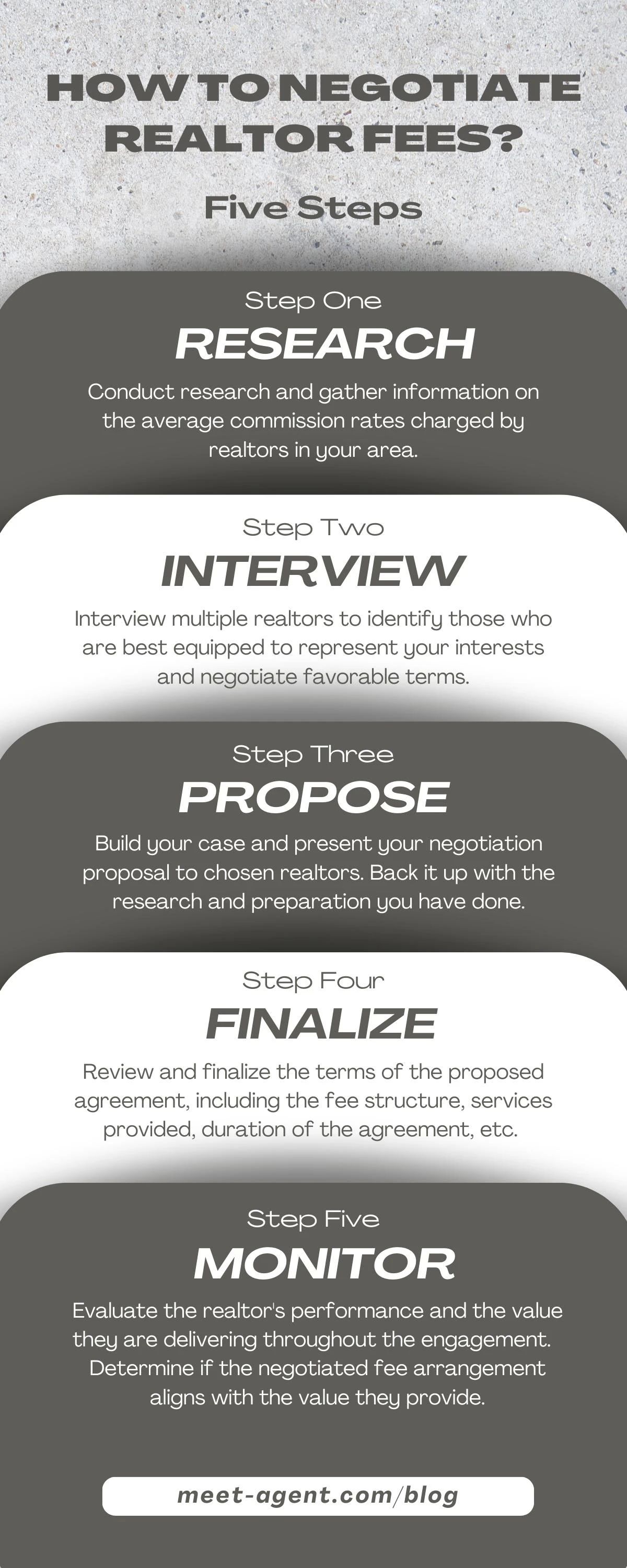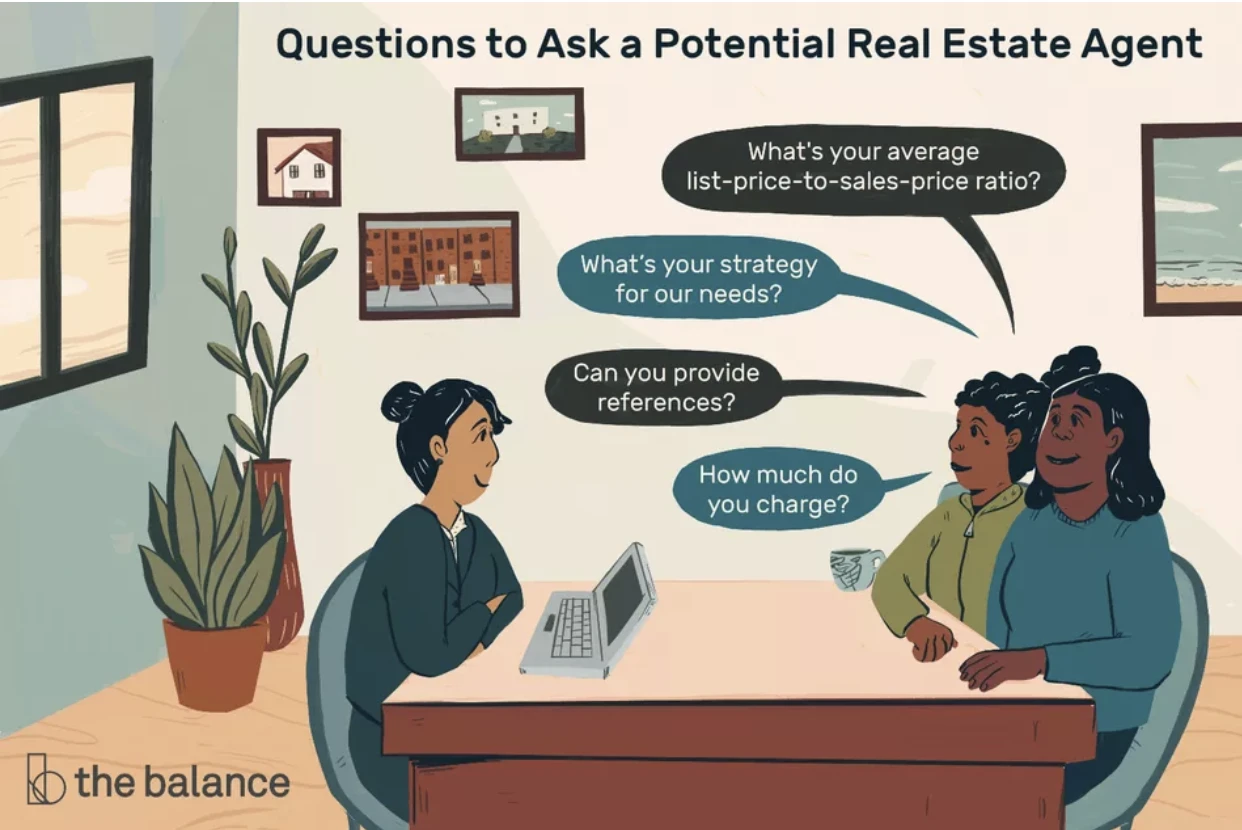How to Negotiate Realtor Fees?
In the competitive real estate market, negotiating realtor fees plays a crucial role in maximizing your financial returns and overall satisfaction. The importance of negotiating realtor fees cannot be overstated. While the standard commission rate is often the starting point, it's essential to remember that fees are negotiable. By taking an active role in fee negotiations, you have the opportunity to align the cost of services with the value provided by the realtor. According to a study by the Consumer Federation of America, negotiating realtor fees can result in significant savings, with potential reductions ranging from 20% to 50% of the standard commission rate.1
By taking an active role in fee negotiations, you have the opportunity to align the cost of services with the value provided by the realtor.
Securing a favorable fee arrangement offers numerous benefits. Firstly, it allows you to retain more of the proceeds from the sale, increasing your overall financial gain. For instance, a reduction in realtor fees from 6% to 5% on a $500,000 home sale would save you $5,000. Secondly, negotiating fees demonstrates your assertiveness as a client and sets the tone for a collaborative working relationship with the realtor. Moreover, it gives you a sense of control and satisfaction, knowing that you've secured a fair and competitive fee structure. By investing time and effort in negotiating realtor fees, you can unlock substantial financial savings and reap the benefits of a favorable fee arrangement.

Research and Preparation
To effectively negotiate realtor fees, it is crucial to understand the typical fee structures prevalent in your market. Conduct research and gather information on the average commission rates charged by real estate agents in your area. According to a survey by Real Trends, the average real estate commission rate in the United States hovers around 5.32% of the home's sale price.2 However, it's important to note that commission rates can vary based on location, property type, and market conditions.
In addition to understanding realtor fees, gather comprehensive information on local market conditions and recent sales data. Analyze market trends, property values, and the overall demand for homes in your area. Accessing reliable sources such as local real estate associations and online platforms can provide valuable insights into the current state of the market. By arming yourself with up-to-date data, you can present a compelling case during fee negotiations and demonstrate your knowledge of the local real estate landscape.
Researching realtor performance and track record is equally crucial. Look for real estate agents with a proven track record of success and positive client testimonials. Utilize online resources, such as review platforms and real estate agent directories, to evaluate the reputation and performance of potential realtors. Consider factors such as experience, expertise in your property type, and their ability to effectively market and sell homes. A thorough assessment of realtor performance will enable you to make informed decisions and select the most qualified professionals for your negotiations.
A thorough assessment of realtor performance will enable you to make informed decisions and select the most qualified professionals for your negotiations.
Interviewing Multiple Realtors
Begin by developing a list of potential realtors to interview. Seek recommendations from trusted sources such as friends, family, or colleagues who have recently worked with real estate agents. Additionally, utilize online platforms and directories that provide comprehensive information about local real estate professionals. By casting a wide net and considering multiple options, you increase your chances of finding the right realtor for your needs.
Before meeting with realtors, prepare a set of well-thought-out questions to ask during the interviews. These questions should cover important aspects such as their experience in the industry, their knowledge of the local market, and their specific strategies for marketing and selling homes. According to a survey by the National Association of Realtors, some key questions to consider include: How many homes have you sold in the past year? How will you price my home and what factors will you consider? What marketing techniques do you use to attract potential buyers?3 Having a prepared list of questions ensures that you gather the necessary information to make an informed decision.
During the interviews, evaluate realtors based on their expertise, experience, and services offered. Consider their track record of successful sales and their knowledge of your specific neighborhood or property type. Look for realtors who demonstrate strong negotiation skills, effective communication, and a deep understanding of the local market conditions. Additionally, assess the services they provide, such as professional photography, virtual tours, or staging assistance. A study by the National Association of Realtors found that 58% of home buyers found virtual tours to be very useful in their home search.4 By evaluating realtors holistically, you can identify those who are best equipped to represent your interests and negotiate favorable terms. (How to Choose the Right Real Estate Agent?)

Building Your Case
To strengthen your position during realtor fee negotiations, determine your property's unique selling points. Identify the distinctive features, amenities, or location advantages that set your property apart from others in the market. By understanding your property's strengths, you can effectively communicate its value and justify the fee arrangement you seek.
Gather relevant market data to support your negotiation. Research recent sales of comparable properties in your area to determine their selling prices and the commission rates associated with those transactions. Utilize online platforms, local real estate databases, or enlist the help of a professional appraiser to access accurate and up-to-date market data. By presenting this information, you can demonstrate that your desired fee arrangement aligns with prevailing market conditions and industry standards.
Highlight any improvements or upgrades made to the property. Showcase the investments you have made in enhancing the property's value, such as renovations, landscaping, or energy-efficient features. According to a study by Remodeling Magazine, certain home improvements, such as kitchen remodels or adding a deck, can yield a high return on investment. By emphasizing these enhancements, you provide tangible evidence of the property's increased worth, further justifying your negotiation stance.
Presenting Your Proposal
Step 1. Schedule a meeting with the chosen realtor(s) to present your negotiation proposal. Arrange a face-to-face meeting or a virtual conference to effectively communicate your expectations and desired fee structure. This direct interaction allows for a deeper understanding of each other's perspectives and facilitates productive discussions.
Step2. Clearly articulate your expectations and desired fee structure to the realtor(s). Explain your preferred fee arrangement, whether it involves a percentage-based commission or a flat fee, and any specific terms or conditions you would like to include. Be transparent about your budgetary constraints and any other factors that may influence your decision. By expressing your needs clearly, you set the foundation for open and constructive negotiations.
Step 3. Justify your proposed fee arrangement with supporting evidence and data. Utilize the market data you have gathered to illustrate the prevailing commission rates in your area. Highlight any unique aspects of your property or specific circumstances that warrant a different fee structure. For example, if your property is highly desirable or if you have made significant improvements that increase its market value, provide supporting evidence and comparable sales data to justify your negotiation position. By grounding your proposal in factual information, you strengthen your case and demonstrate your commitment to a fair and reasonable negotiation process.
Negotiation Techniques
During the negotiation, it is crucial to stay confident and assertive. Present your case with conviction and back it up with the research and preparation you have done. Maintain a professional and respectful tone while advocating for your desired fee arrangement. Confidence and assertiveness can help you establish yourself as a serious and knowledgeable client, which may positively influence the negotiation process.
Consider offering incentives or alternative arrangements to create win-win solutions. For example, you could propose a higher commission rate in exchange for additional marketing efforts or enhanced services. Alternatively, you may suggest a tiered commission structure where the percentage decreases as the sale price increases. These creative approaches can demonstrate your willingness to work collaboratively and find mutually beneficial terms.
Be open to compromise and find a mutually beneficial solution. Negotiations often involve give and take, so it's important to be flexible and receptive to alternative proposals from the realtor. Evaluate the overall value of the services provided and weigh them against the proposed fee structure. Look for opportunities to reach a middle ground that satisfies both parties' needs and interests. Data from the National Association of Realtors shows that successful negotiation often involves finding common ground and building rapport. By adopting a cooperative mindset, you increase the chances of reaching an agreement that works for both you and the realtor.

Reviewing and Finalizing the Agreement
Carefully review the terms of the proposed agreement before finalizing the negotiation. Thoroughly examine all aspects, including the fee structure, services provided, duration of the agreement, and any additional clauses or conditions. Ensure that the agreement accurately reflects the negotiated terms and aligns with your expectations. Pay attention to any potential ambiguities or areas that require clarification.
Seek legal advice if needed to ensure that the agreement is fair and legally binding. Real estate transactions can involve complex legal aspects, so consulting with an attorney specializing in real estate law can provide valuable insights and help protect your interests. They can review the agreement, offer guidance on potential risks or issues, and ensure compliance with relevant laws and regulations.
Seek legal advice if needed to ensure that the agreement is fair and legally binding.
Make necessary revisions to the agreement based on your review and any input from legal advisors. Discuss any concerns or suggested changes with the realtor and work towards a finalized version that both parties are comfortable with. Once the agreement is in its final form, ensure that all parties sign the document to make it legally binding. According to the National Association of Realtors, having a signed agreement in place protects both the client and the realtor, providing a clear framework for their professional relationship.
By following these steps and taking a meticulous approach to the review and finalization process, you can ensure that the negotiated agreement accurately reflects the terms discussed and establishes a solid foundation for a successful working relationship with your chosen realtor.
Monitoring Performance
Regularly communicate with your realtor throughout the process to stay informed and address any questions or concerns that may arise. Open and transparent communication is essential for maintaining a strong working relationship. Discuss the progress of your real estate transaction, provide updates on your expectations, and address any changes or new information that may impact the agreed-upon fee structure.
Evaluate the realtor's performance and the value they are delivering throughout the engagement. Assess their responsiveness, market knowledge, negotiation skills, and ability to meet your needs and goals. Compare their performance to industry benchmarks and data on client satisfaction and success rates. By reviewing their performance objectively, you can determine if the negotiated fee arrangement aligns with the value they provide.
Provide feedback and address any concerns promptly and constructively. If you have any reservations or encounter issues during the course of your engagement, communicate them to the realtor in a professional manner. This feedback can help address any areas for improvement and strengthen the working relationship. The National Association of Realtors emphasizes the importance of addressing concerns and providing feedback, as it allows for continuous improvement and helps ensure a positive experience for both parties.
Monitoring the performance of your realtor allows you to ensure that the agreed-upon fee arrangement is justified by the level of service and value they deliver. Regular communication, evaluation, and feedback create a dynamic and collaborative partnership that can result in a successful real estate transaction.
Conclusion
In conclusion, negotiating realtor fees is a crucial step in the real estate process. By actively engaging in fee negotiations, you have the opportunity to optimize your financial outcome and ensure a fair arrangement. The data shows that even a small reduction in realtor fees can result in significant savings, which can be redirected towards other aspects of your real estate transaction or investment.
Securing a favorable fee arrangement can bring multiple benefits. It not only reduces your overall transaction costs but also aligns the incentives of your realtor with your own objectives. By negotiating a fee structure that reflects the value and level of service you require, you can increase your confidence in the realtor-client relationship and enhance the overall satisfaction with the transaction outcome.
We encourage readers to take proactive steps in negotiating their realtor fees. Armed with knowledge, market research, and the techniques outlined in this guide, you have the tools to engage in effective negotiations. Remember, negotiating fees is a common practice in the real estate industry, and realtors expect this level of engagement from their clients. By advocating for yourself and being diligent throughout the process, you can secure a fee arrangement that aligns with your goals and ensures a successful real estate transaction.
By following the strategies outlined in this guide, you can confidently navigate the negotiation process and achieve a favorable realtor fee arrangement.
Looking for local agents?
Search, compare and connect with top-ranked agents. Find the best local agent & lower rates.



